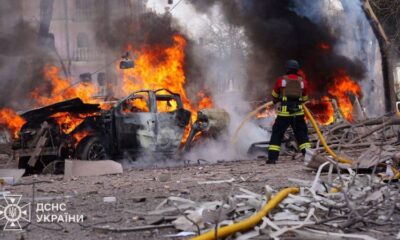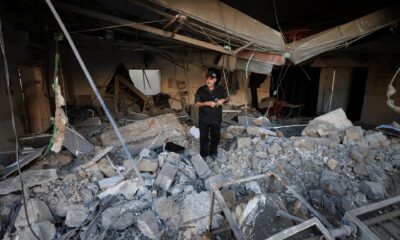Conflict Zones
Lebanese Civil War began 50 years ago. Here’s how one photographer saw it | History

On this day in 1975, Claude Salhani was a 23-year-old Lebanese photojournalist working for the Annahar newspaper.
At the time, he dreamed of going to Vietnam and taking the kind of powerful war images he had seen and admired.
However, he wouldn’t have to leave his country to cover war.
On April 13, 1975, the Phalangist militia attacked a bus in Beirut’s Ain el-Remmaneh neighbourhood, kicking off a civil war that lasted 15 years.
The bus was carrying Palestinians and Lebanese home from a political rally by the Popular Front for the Liberation of Palestine – General Command (PFLP-GC).
The Phalangists were responding to a drive-by assassination attempt on their leader, Pierre Gemayel, outside a church. Gemayel was unscathed, but others were killed, including Gemayel’s bodyguard and a Phalangist whose child was being baptised that day.
The lead-up to the Lebanese Civil War was not devoid of other incidents, but Salhani said it was clear something was different after that day.
Over the next nine years, Salhani would capture the brutal reality of the war – Christian and pro-Palestinian militias, the warlords pulling their strings and, most importantly, their victims.
He was threatened by right-wing Christian militias, kidnapped by a Palestinian faction, and wounded by Israeli shelling that broke his ankle and a car crash that left his two front teeth hanging by their roots.
Salhani covered the war for Annahar, the French photo agency Sygma, and the United Press International and Reuters news agencies. His images were featured on the cover of news magazines like Time and Newsweek.
In 1983, he was nominated for a Pulitzer Prize for a photo of a young man dressed in US military fatigues, wiping away a tear after two suicide trucks rammed a barracks and killed more than 240 US military members.
He left Beirut in 1984, hurt by what his home had become. He promised never to return but came back for a visit in 2000 and then returned infrequently until his death.
Salhani died in 2022 in Paris at the age of 70.
He spoke of returning to Lebanon until his final days.
Conflict Zones
Sudan war to enter third year as RSF assaults in Darfur intensify | Sudan war News

The United Nations and rights groups are calling for an end to the violence in Sudan as the second anniversary of its civil war looms and the paramilitary Rapid Support Forces (RSF) has intensified its attacks in Darfur, killing dozens of people in recent days.
As representatives from dozens of countries are to meet in London on Tuesday to try to resolve the Sudan crisis, Human Rights Watch urged the international community to “urgently work to protect civilians and guarantee safe, unfettered aid provision” in the country.
“For the last two years, Sudan’s warring parties have subjected the population to horrific abuses and suffering, and blocked aid, plunging the country into the world’s worst humanitarian disasters,” Mohamed Osman, Sudan researcher at Human Rights Watch, said in a statement on Monday.
“International leaders should ensure that discussions to improve the humanitarian situation go hand in hand with commitments at the highest level to protect civilians.”
This week marks two years since war broke out on April 15, 2023, between the RSF and the Sudanese military. It has killed thousands of people, displaced some 13 million people, according to the United Nations High Commissioner for Refugees (UNHCR), and sparked a hunger crisis in parts of the country.
In recent weeks, the army has managed to push RSF fighters out of the capital, Khartoum, but the paramilitary group has been claiming advances in the western region of Darfur, where an already dire humanitarian crisis has been worsening.
On Sunday, the RSF said it took control of the Zamzam camp for displaced people near el-Fasher, the provincial capital of North Darfur state.
The assault has killed dozens of people, including 23 children and nine aid workers, according to the UN.
‘Thousands of displaced trapped and cut off from aid’
The UN Office for the Coordination of Humanitarian Affairs (OCHA) warned on Monday that the fighting near el-Fasher, which has been under an RSF blockade, is hampering access to humanitarian assistance.
“Thousands of displaced people are trapped & cut off from aid,” OCHA Sudan said in a social media post.
“Hostilities must stop now. All those engaged in the conflict must ensure safe passage for civilians and humanitarian access.”
UN Secretary-General Antonio Guterres had condemned the attacks on civilians in and around el-Fasher, urging an end to the fighting.
“The Secretary-General emphasizes that attacks directed against civilians and indiscriminate attacks are strictly prohibited under international humanitarian law,” Guterres said in a statement issued via his spokesperson on Sunday.
“Humanitarian relief personnel and medical personnel must be respected and protected. The perpetrators of these attacks must be brought to justice. Safe, unhindered and sustained access to the area, including the Zamzam camp, is urgently needed. Civilians who want to leave must be allowed to do so safely.”
In a joint statement on Monday, Egypt and Qatar also expressed “grave concerns over the ongoing armed conflict in the Sudan and emphasized the importance of an immediate cessation of military operations”.
Warring rival generals
But the violence continued on Monday. Al Jazeera Arabic quoted local sources in reporting that RSF fighters were shelling the Abu Shouk camp for displaced people outside el-Fasher.
Sudan has seen growing instability since longtime President Omar al-Bashir was removed from power in 2019 after months of antigovernment protests.
In October 2021, the Sudanese military staged a coup against the civilian government of Prime Minister Abdalla Hamdok, leading to his resignation in early 2022.
Sudan’s army chief, Abdel Fattah al-Burhan, and his rival general Mohamed Hamdan Dagalo, who leads the RSF, shared power after the coup but then started fighting for control of the state and its resources in April 2023.
Davis Makori, humanitarian policy and advocacy specialist, highlighted the impact of the war on children – including psychological trauma, gender-based violence and inability to attend school – saying minors make up half of the civilians affected by the conflict.
“While there are pockets of states in Sudan that are not actually active conflict zones, this humanitarian crisis has spread to almost every facet of life,” Makori told Al Jazeera.
Conflict Zones
Animated maps show two years of war in Sudan | Sudan war News

Two years into the war in Sudan, the country remains engulfed in one of the world’s largest and fastest-growing displacement crises.
Since April 15, 2023, a brutal struggle for power between the Sudanese Armed Forces (SAF), led by Abdel Fattah al-Burhan, and the paramilitary Rapid Support Forces (RSF), commanded by Mohamed Hamdan “Hemedti” Dagalo, has turned cities into battlegrounds and forced more than 14 million people to flee their homes.
In recent weeks, the SAF has taken the capital, Khartoum, and forced the RSF to retreat.
More than 11,000 recorded attacks
From April 15, 2023, to March 28, 2025, at least 11,292 attacks were recorded, averaging 16 per day, according to the Armed Conflict Location & Event Data (ACLED) project.
According to it, Sudan’s army was behind 50 percent of all recorded attacks (5,615), while the RSF carried out 38 percent (4,291). The remaining 12 percent (1,386 attacks) were attributed to various other groups, including the Darfur Communal Militia, Darfur Arab Militia, Sudan People’s Liberation Movement, Twic Clan Militia, and others.
These attacks include armed clashes, air or drone strikes, shelling, artillery or missile attacks, looting or property destruction, and remote explosives or landmines.
The map below shows the geographical spread and intensity of conflict incidents across Sudan’s 18 states.
Nearly three-quarters of all attacks have centred around three main regions:
Khartoum
Sudan’s capital has been the epicentre, with 5,519 attacks, or 49 percent of all recorded incidents.
The army maintains its operations in and around the capital, saying it aims to dislodge the remaining RSF positions.
Gezira
Just south of Khartoum, Gezira – Sudan’s key agricultural state – has recorded 1,485 attacks, which is 13 percent of total incidents.
Once considered relatively stable, it became a key battleground as RSF forces expanded southwards.
North Darfur
In North Darfur, the RSF has launched several attacks on displacement camps and local militias. The region has seen 1,388 attacks – 12 percent of the national total.
Rest of Sudan
The remaining 26 percent of the fighting has been spread across the country, including:
South Darfur: 511 attacks (5 percent)
North Kordofan: 463 attacks (4 percent)
West Darfur: 310 attacks (3 percent)
Tens of thousands of people killed
According to ACLED, at least 32,973 people have been reported killed across Sudan, though the actual death toll is likely much higher, especially when accounting for deaths caused by indirect reasons such as the spread of disease, malnutrition, and lack of adequate healthcare.
Half of the recorded deaths have occurred in Khartoum and North Darfur, which have the highest casualty rate.
Timeline of attacks
After months of rising tensions, on April 15, 2023, heavy gunfire and explosions erupted in Khartoum, a city of 10 million people. Gunfire was heard near key locations, including the army headquarters, the Ministry of Defence, the presidential palace, and Khartoum international airport.

By the end of August 2023, attacks reached their highest intensity, with 675 combined attacks recorded. The United Nations reported that one million people had fled the country, and internal displacement had exceeded 3.4 million.
Following a brief decline in attacks, violence again intensified in January 2024. By then, the UN reported that eight million people had been displaced by the war as famine loomed across the country.
In September 2024, the SAF carried out air raids against RSF positions in Khartoum, its largest assault in months.
A slight decline in the frequency of attacks was observed after January 2025. While violence remained concentrated in key regions, there was a brief respite from the intensity of earlier months.
Khartoum airport turned into aircraft graveyard
Using satellite imagery over the past two years, Al Jazeera’s fact-checking agency, Sanad, has mapped extensive destruction at Khartoum international airport.
Analysis reveals that the conflict has led to the destruction of at least 49 aircraft and severe damage to some 70 airport structures, including runways, infrastructure, and other facilities.

14 million people displaced
The UN says Sudan is facing the world’s worst displacement crisis, as the war continues with no end in sight.
More than 14 million people have been forced to flee their homes due to the ongoing conflict.
Of those, at least 11.3 million people have been displaced within Sudan, according to the latest figures from the International Organization for Migration (IOM).
At least three million people have crossed international borders, placing immense strain on neighbouring countries, including Chad, South Sudan, and Egypt.
Main regions of origin for displaced people:
Khartoum: 3,500,400 displaced (31% of the total)
South Darfur: 2,082,537 displaced (18%)
North Darfur: 1,844,175 displaced (16%)
Main destinations for the internally displaced people:
South Darfur: 1,837,706 displaced (16% of the total)
North Darfur: 1,786,909 displaced (16%)
River Nile: 935,723 displaced (8%)
Conflict Zones
Gaza’s al-Ahli Hospital targeted by Israeli missiles | Israel-Palestine conflict News

Israeli forces have targeted Gaza’s al-Ahli Hospital with missiles, destroying the emergency unit and putting the only functioning hospital in northern Gaza out of service, according to Al Jazeera correspondents.
Health officials at the hospital evacuated patients, while some of them, including critically ill patients, were forced to flee after the Israeli military issued a warning before the attack.
The air strike came “minutes after the army’s warning to evacuate this building of patients, the injured and their companions”, the Palestinian Civil Defence in Gaza said in a statement on Sunday.
“The bombing led to the destruction of the surgery building and the oxygen generation station for the intensive care units,” it added.
Hospitals, protected under international humanitarian law, have repeatedly been hit by Israeli air raids in Gaza since the start of the war on the enclave on October 7, 2023.
“Critically ill patients, including those in the surgical and emergency units, are now left without shelter or oxygen,” Al Jazeera’s Tareq Abu Azzoum, reporting from Deir el-Balah in northern Gaza, said.
Razan al-Nahhas, an emergency doctor currently working in central Gaza who previously worked at al-Ahli Hospital, said at least three people, including a 12-year-old boy with a head injury, were reported dead following the forced evacuation.
The Israeli military said the hospital was targeted because it was being used as a “command and control” centre by the “terrorist organization Hamas”.
In its statement, Gaza’s Government Media Office condemned the attack as a “heinous and filthy crime”, saying Israel “deliberately destroyed and rendered out of service 34 hospitals as part of a systematic plan to dismantle what remains of the healthcare sector in the Gaza Strip”.
In October 2023, an attack on the hospital had killed 500 people.
Israel has repeatedly attacked hospitals in the Palestinian enclave with impunity throughout its devastating war.
-

 Europe2 days ago
Europe2 days agoRussian strikes on northeastern Ukrainian city of Sumy kill 32, in deadliest attack this year
-

 Middle East2 days ago
Middle East2 days agoTimeline: Israel’s attacks on hospitals throughout its war on Gaza | Israel-Palestine conflict News
-

 Sports2 days ago
Sports2 days ago‘He’s out of his mind right now’: Rory McIlroy blazes to historic third round lead at the Masters
-

 Middle East1 day ago
Middle East1 day agoSudan’s RSF claims control of famine-hit Zamzam camp in Darfur | Sudan war News
-

 Sports2 days ago
Sports2 days agoFan controversially rips ball from Mike Trout’s glove and Los Angeles Dodgers suffer record-breaking defeat
-

 Africa2 days ago
Africa2 days agoGabon awaits presidential election outcome after peaceful vote
-

 Europe2 days ago
Europe2 days agoGreece: Bomb goes off outside Hellenic Train offices in Athens, no injuries
-

 Education10 hours ago
Education10 hours agoHarvard rejects Trump administration demands amid threats of funding cuts




